Document Translation Services: Why 99.9% Accuracy Matters for Visa Success
Why 99.9% translation accuracy determines visa success. Professional document translation vs DIY risks for Ausbildung applications.

Table of Contents
- The Critical Role of Document Translation in German Visa Applications
- Why German authorities require certified translations
- Common document types that need translation for Ausbildung visas
- Legal requirements and standards for official translations
- Understanding the 99.9% Accuracy Standard
- What constitutes translation accuracy in legal contexts
- Difference between general translation and certified translation
- How even minor errors can derail visa applications
- Essential Documents for Ausbildung Visa Applications
- Academic Transcripts and Diplomas Requiring Translation
- Personal Documents (Birth Certificates, Passports, etc.)
- Financial Documents and Sponsor Letters
- Consequences of Translation Errors in Visa Processing
- Real Case Studies of Rejected Applications Due to Translation Mistakes
- Timeline Delays Caused by Document Resubmission
- Financial Impact of Visa Rejections and Reapplications
- Choosing Professional vs. DIY Translation Services
- Certified Translators vs. Online Translation Tools
- Cost Comparison and Long-Term Value Analysis
- Red Flags to Avoid When Selecting Translation Services
- The German Visa Application Timeline and Translation Planning
- When to Start the Translation Process
- Processing Times for Different Document Types
- Building Buffer Time for Potential Revisions
- Quality Assurance in Professional Translation Services
- Multi-step Review Processes Used by Certified Translators
- Technology Tools That Enhance Accuracy
- Certification and Apostille Requirements for German Authorities
- Cost-Benefit Analysis of Premium Translation Services
- Breakdown of Professional Translation Costs
- Hidden Costs of Rejected Visa Applications
- ROI of Investing in High-Accuracy Translation Services
- Frequently Asked Questions
- Question 1: How much should I budget for certified document translations for my German Ausbildung visa?
- Question 2: Can I translate my documents myself to save money, then have them certified?
- Question 3: How long does the certified translation process typically take?
- Question 4: What happens if my translator makes a small mistake – will my visa be automatically rejected?
- Question 5: Do I need to translate documents that are already in English for German visa applications?
- Question 6: How can I verify that my translator is properly certified for German visa applications?
- Question 7: Should I get extra certified copies of my translations in case something goes wrong?
- Question 8: What should I do if German authorities question the accuracy of my certified translations?
- Conclusion
Imagine spending months preparing your Ausbildung application for Germany, gathering all required documents, paying application fees, and waiting weeks for a response—only to receive a rejection letter citing "insufficient documentation" due to a single mistranslated word on your academic transcript. This scenario happens more often than you might think, and it's entirely preventable.
For international students pursuing vocational training opportunities in Germany, document translation isn't just a bureaucratic hurdle—it's the foundation upon which your entire visa application stands. German immigration authorities operate with strict precision, and even the smallest discrepancy between your original documents and their translations can trigger automatic rejections, setting back your educational dreams by months or even years.
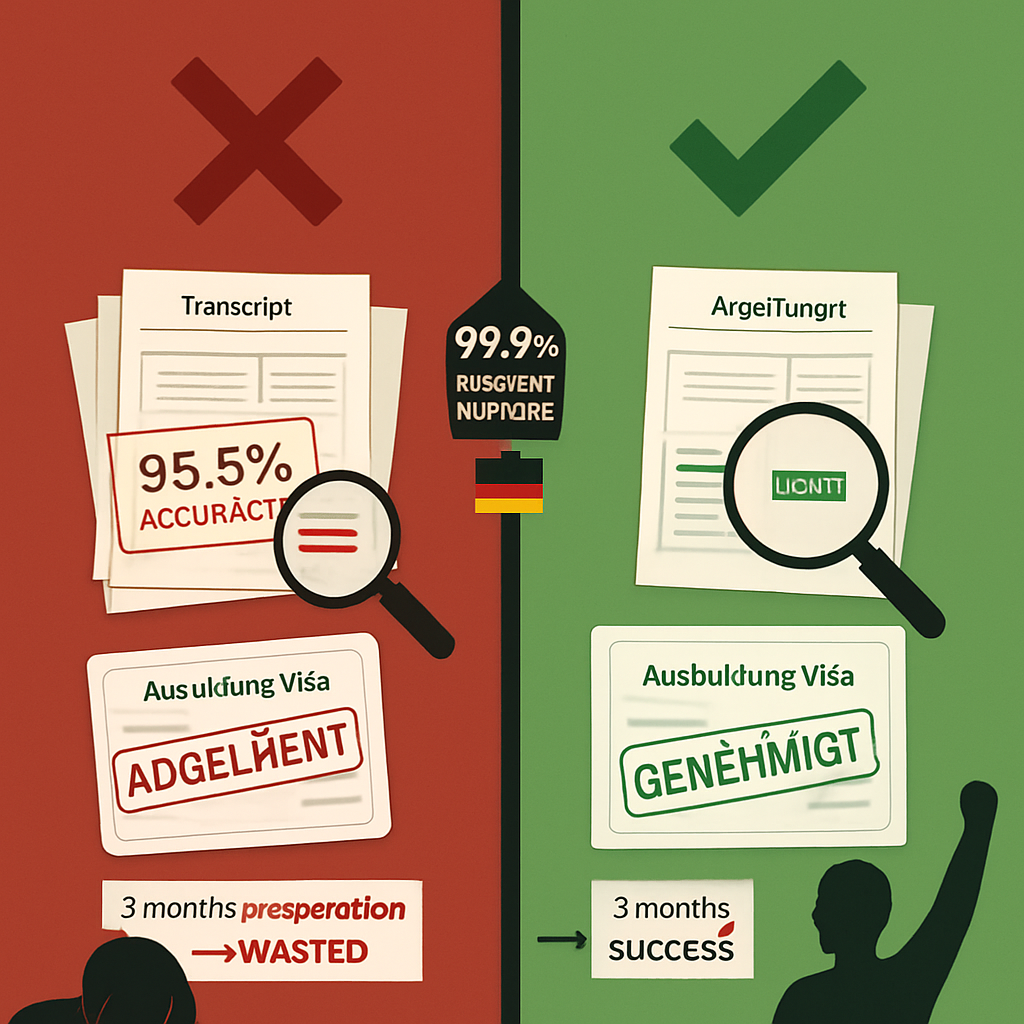
The difference between 95% and 99.9% translation accuracy might seem negligible, but in the context of visa applications, that 4.9% gap represents the difference between approval and rejection. A mistranslated grade, an incorrect date, or an improperly formatted certificate number can raise red flags with immigration officers who process hundreds of applications daily and have zero tolerance for inconsistencies.
Professional document translation services specializing in German visa applications understand these stakes. They recognize that your academic transcripts, financial statements, and personal documents aren't just papers to be translated—they're the building blocks of your future career in Germany. When translation agencies achieve 99.9% accuracy rates, they're not just converting words from one language to another; they're preserving the precise meaning, formatting, and legal validity that German authorities demand.
This comprehensive guide will walk you through why translation accuracy matters so critically for Ausbildung visa success, how to identify quality translation services, and what you can do to ensure your documents meet Germany's exacting standards. Your educational journey in Germany starts with getting these translations right the first time.
The Critical Role of Document Translation in German Visa Applications
Why German authorities require certified translations
German immigration authorities operate under strict legal frameworks that mandate all foreign documents be submitted in German or accompanied by certified translations. This requirement stems from the German Administrative Procedure Act (Verwaltungsverfahrensgesetz), which ensures that officials can properly evaluate applications without language barriers compromising the assessment process.
The legal foundation requires that translations be performed by court-appointed translators or sworn translators (vereidigte Übersetzer) who are officially recognized by German authorities. These professionals bear legal responsibility for translation accuracy and can face penalties for errors, making their certifications crucial for visa success.
Common document types that need translation for Ausbildung visas
Students applying for German Ausbildung programs must translate numerous documents, each serving specific verification purposes:
Academic Documents:
- High school diplomas and transcripts
- University degrees and academic records
- Professional certificates and qualifications
- Language proficiency certificates
Personal Documentation:
- Birth certificates
- Passport biographical pages
- Marriage certificates (if applicable)
- Medical examination reports
Financial and Legal Papers:
- Bank statements and financial guarantees
- Employment contracts or job offers
- Insurance policies
- Parental consent forms (for minors)
Application-Specific Documents:
- Training contract (Ausbildungsvertrag)
- Company registration documents
- Chamber of Commerce confirmations
- Housing contracts or accommodation proof
Legal requirements and standards for official translations
German law establishes specific standards for acceptable translations through the Federal Office of Justice regulations. Certified translations must include:
| Required Element | Description | Legal Basis |
|---|---|---|
| Translator's certification | Official stamp and signature | BNotO §142 |
| Completeness declaration | Confirmation of full translation | VwVfG §23 |
| Accuracy statement | Legal guarantee of precision | DOlmG §8 |
| Date and location | When and where translation occurred | Administrative requirement |
The translation must be performed by professionals holding official appointments from German courts or recognized translation organizations. These translators undergo rigorous examination processes and maintain professional liability insurance.
Critical compliance requirements include:
- Translations must be complete - partial translations are rejected
- All stamps, seals, and official markings must be described
- Original formatting and document structure must be preserved
- Any illegible portions must be noted as such
- Translator's credentials must be clearly identified
Non-compliance with these standards results in automatic application rejection, requiring complete resubmission with proper documentation. German consulates maintain strict interpretation of these requirements, with no exceptions for minor deviations.
Understanding the 99.9% Accuracy Standard
What constitutes translation accuracy in legal contexts
Legal translation accuracy encompasses multiple precision layers beyond simple linguistic conversion. In German immigration contexts, accuracy means complete semantic, legal, and contextual equivalence between source and target documents.
Semantic accuracy requires precise meaning transfer without interpretation or paraphrasing. Every term must convey identical information in both languages, particularly crucial for technical educational terminology and legal concepts.
Legal accuracy demands understanding of both source and target legal systems. A "high school diploma" from different countries carries varying legal weights, requiring translators to use precise German equivalents that accurately reflect educational levels.
Contextual accuracy ensures cultural and administrative concepts translate appropriately. Professional titles, institutional names, and certification levels must align with German educational and professional frameworks.
Difference between general translation and certified translation
| Aspect | General Translation | Certified Translation |
|---|---|---|
| Legal validity | None | Legally binding |
| Translator qualification | Any language professional | Court-appointed/sworn translator |
| Accuracy standard | 95-98% typical | 99.9% mandatory |
| Error tolerance | Minor errors acceptable | Zero tolerance for inaccuracies |
| Legal responsibility | Limited | Full legal liability |
| Cost | €15-25 per page | €25-40 per page |
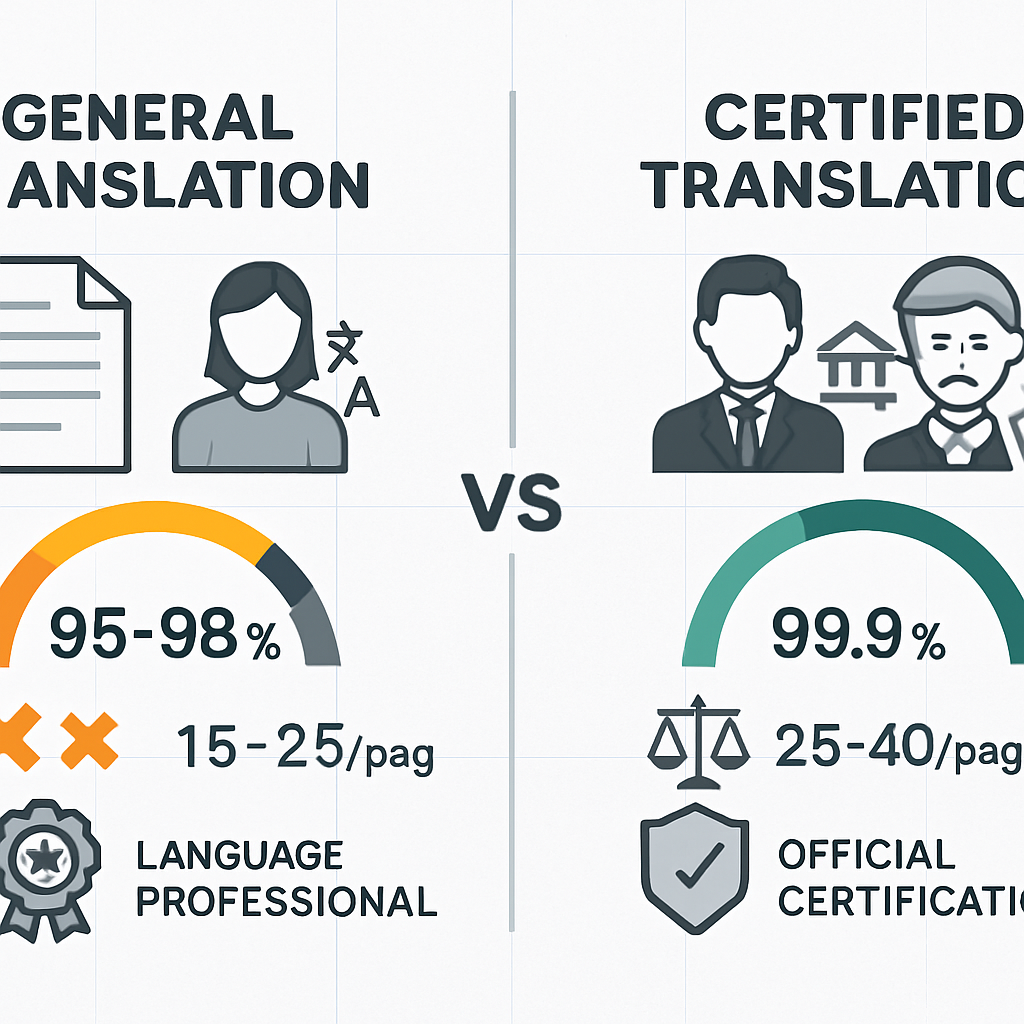
Certified translators undergo specialized training in legal terminology, document formatting, and accuracy verification procedures. They maintain professional liability insurance and face legal consequences for errors, creating financial incentives for precision.
How even minor errors can derail visa applications
Immigration authorities treat translation errors as potential fraud indicators, triggering comprehensive application reviews that delay or deny visas.
Common minor errors with major consequences:
- Date format inconsistencies (DD/MM vs MM/DD) can suggest document manipulation
- Grade point average calculation errors may misrepresent academic qualifications
- Currency conversion mistakes in financial documents raise fraud suspicions
- Institutional name variations can trigger verification delays
Real-world impact scenarios:
A single digit error in graduation dates created a six-month application delay when authorities suspected forged documents. The student missed their Ausbildung start date, requiring complete program reapplication.
Incorrect translation of professional certification levels led to qualification mismatching, resulting in visa denial despite meeting actual requirements. The error suggested the applicant lacked necessary credentials.
Verification cascades occur when errors prompt authorities to scrutinize entire applications. One translation mistake can trigger additional document requests, background checks, and interview requirements, extending processing times from weeks to months.
The 99.9% accuracy standard exists because immigration decisions affect life trajectories. German authorities prioritize system integrity over individual convenience, making precision non-negotiable for visa success.
Essential Documents for Ausbildung Visa Applications
Academic Transcripts and Diplomas Requiring Translation
Academic credentials form the foundation of your Ausbildung visa application. German immigration authorities require certified translations of all educational documents to verify your qualifications meet program requirements.
Primary Academic Documents:
- High school diploma or equivalent certificate
- University transcripts (if applicable)
- Vocational training certificates
- Language proficiency certificates (IELTS, TOEFL, etc.)
- Academic achievement awards or honors
Each document must include precise translation of grades, course names, and institutional details. German authorities use specific grade conversion systems, making accurate translation of academic performance indicators crucial for application success.
Personal Documents (Birth Certificates, Passports, etc.)
Personal identification documents establish your legal identity and eligibility for visa processing. These documents require meticulous translation attention to prevent processing delays.
Required Personal Documents:
| Document Type | Translation Requirements | Processing Impact |
|---|---|---|
| Birth Certificate | Full names, dates, locations | Identity verification |
| Passport | All entries, stamps, visas | Travel history validation |
| Marriage Certificate | Legal names, dates, locations | Dependent status confirmation |
| Police Clearance | All sections, official seals | Security background check |
Critical Translation Elements:
- Exact spelling of names across all documents
- Consistent date formats (DD.MM.YYYY for German standards)
- Proper translation of official titles and positions
- Accurate rendering of government seal descriptions
Financial Documents and Sponsor Letters
Financial documentation proves your ability to support yourself during Ausbildung training. German authorities require comprehensive financial evidence with precise monetary translations.
Essential Financial Documents:
- Bank statements (last 3-6 months)
- Sponsor declaration letters (Verpflichtungserklärung)
- Income certificates from employers
- Scholarship award letters
- Property ownership documents
Sponsor Letter Requirements:
- Sponsor's complete financial information
- Relationship declaration to applicant
- Commitment duration and amount
- Legal obligations acknowledgment
Financial amounts must be translated using current exchange rates at document preparation time. Inconsistent currency conversions can trigger additional verification requests, delaying visa processing by weeks.
Consequences of Translation Errors in Visa Processing
Real Case Studies of Rejected Applications Due to Translation Mistakes
Case Study 1: Medical Training Application
A student applying for medical Ausbildung had their visa rejected due to incorrect translation of their biology course grades. The translator converted "Distinction" to "Auszeichnung" instead of the proper academic term "Sehr gut," leading authorities to question grade authenticity. Reapplication required 4 additional months.
Case Study 2: Engineering Apprenticeship
An applicant's birth certificate translation contained a one-letter spelling difference in their surname compared to their passport. German authorities flagged this as potential identity fraud, resulting in immediate application rejection and requiring legal documentation to prove name consistency.
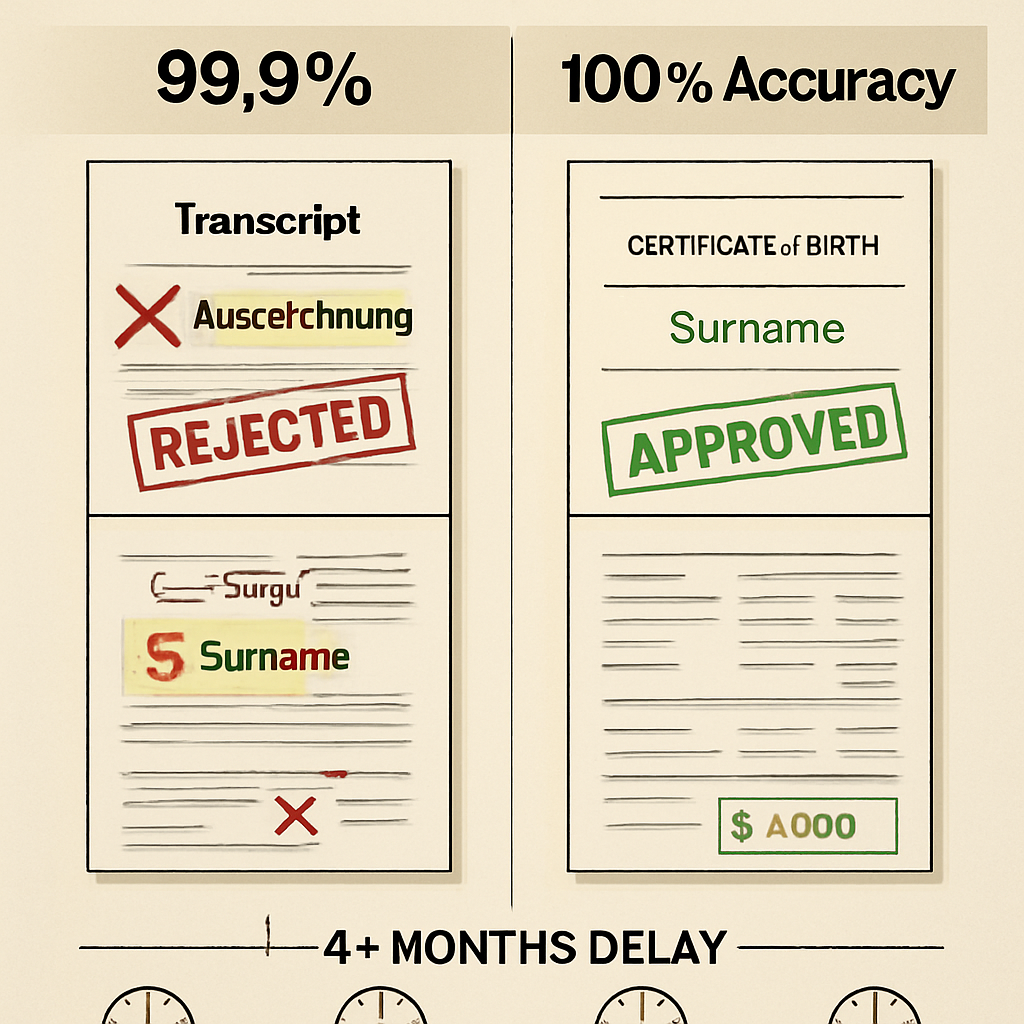
Case Study 3: Financial Documentation Error
A sponsor letter incorrectly translated monthly income from $3,200 to €3,200 instead of the accurate €2,680. This inflated amount triggered a financial investigation, delaying visa approval by 8 weeks while authorities verified actual sponsor capacity.
Timeline Delays Caused by Document Resubmission
Translation errors create cascading delays throughout the visa process:
Standard Processing Timeline:
- Initial review: 2-4 weeks
- Document verification: 1-2 weeks
- Final decision: 1-2 weeks
Error-Induced Delays:
- Error identification: +2-3 weeks
- Retranslation process: +1-2 weeks
- Resubmission review: +2-4 weeks
- Additional verification: +1-3 weeks
Total delay impact: 6-12 additional weeks beyond standard processing time.
Financial Impact of Visa Rejections and Reapplications
Translation errors generate significant financial consequences beyond initial service costs:
Direct Costs:
- Visa application fee: €75-100 per attempt
- Retranslation services: €200-500
- Legal consultation: €150-300 per hour
- Express processing fees: €200-400
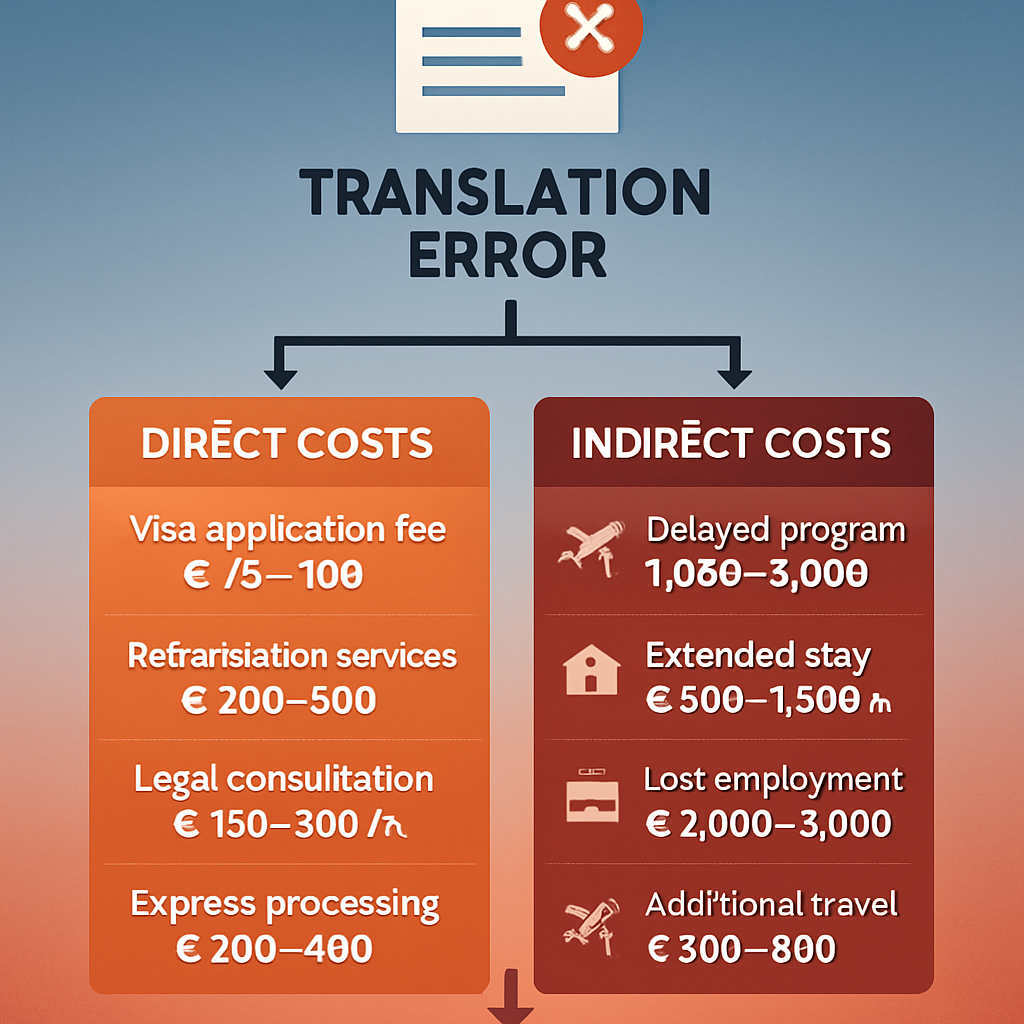
Indirect Costs:
- Delayed program start: €1,000-3,000 in accommodation
- Extended current country stay: €500-1,500 monthly
- Lost employment opportunities: €2,000-5,000
- Additional travel arrangements: €300-800
Total financial impact: €4,000-11,000 for major translation errors requiring complete reapplication.
Students experiencing visa rejections due to translation errors often face semester delays, forcing them to reapply for subsequent program intakes and potentially losing reserved positions in competitive Ausbildung programs.
Choosing Professional vs. DIY Translation Services
Certified Translators vs. Online Translation Tools
The choice between professional certified translators and DIY translation tools can make or break your German visa application. While Google Translate or DeepL might seem convenient for everyday use, they lack the legal recognition required for official documents.
Professional Certified Translators:
- Provide legally recognized translations with official stamps
- Understand legal terminology and cultural nuances
- Offer liability insurance for their work
- Follow strict quality assurance protocols
Online Translation Tools:
- Cannot provide certified translations
- Miss context-specific meanings
- Lack understanding of legal document formats
- Produce translations rejected by German authorities
Consider this example: An online tool might translate "Abitur" as simply "high school diploma," while a certified translator would provide the precise equivalent with proper context notes explaining the German education system.
Cost Comparison and Long-Term Value Analysis
| Service Type | Initial Cost | Hidden Costs | Total Investment |
|---|---|---|---|
| DIY Translation | €0-50 | Visa rejection (€75), Reapplication fees (€300+), Delayed start dates | €375+ |
| Professional Service | €150-400 | None | €150-400 |
Professional Translation Benefits:
- One-time investment with guaranteed acceptance
- Faster processing times
- Expert guidance on document requirements
- Peace of mind and reduced stress
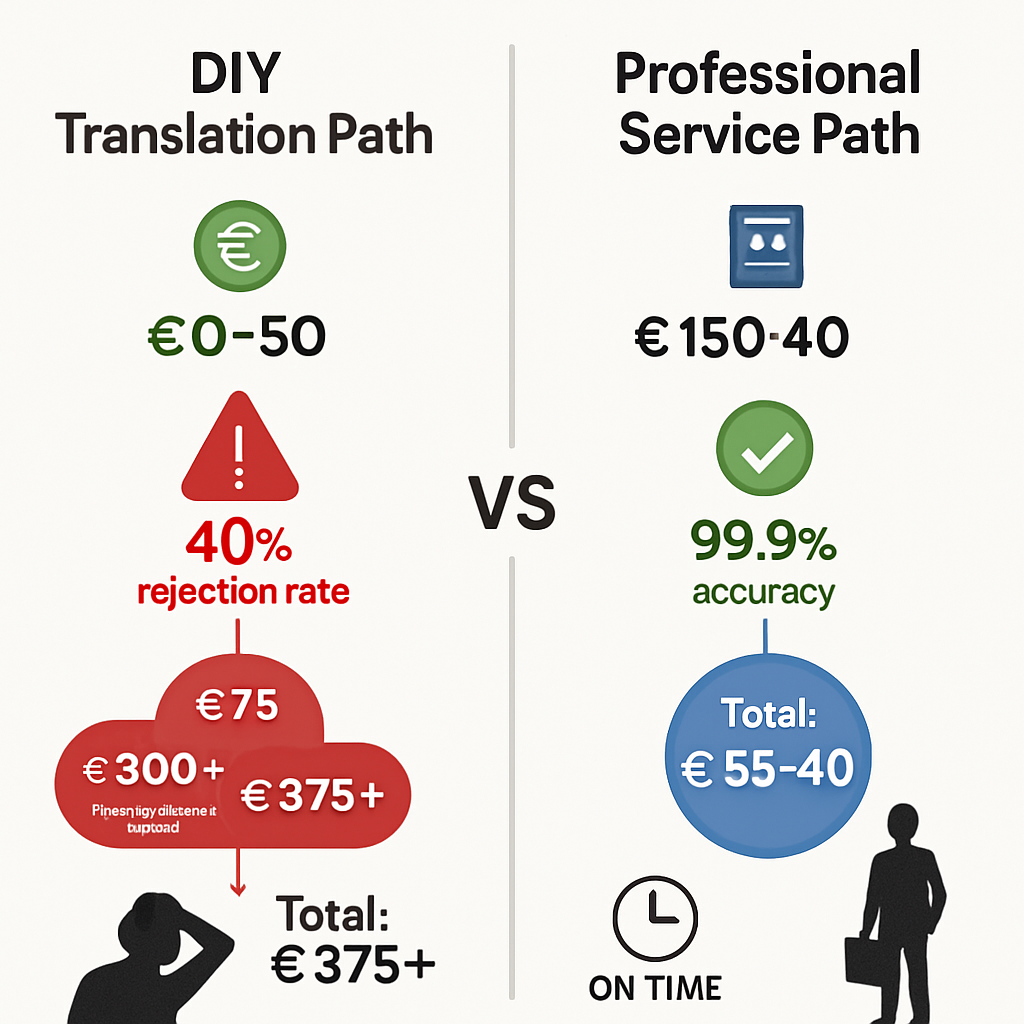
DIY Translation Risks:
- High rejection rates (up to 40% for self-translated documents)
- Multiple resubmission costs
- Delayed program start dates
- Potential loss of placement opportunities
Red Flags to Avoid When Selecting Translation Services
Warning Signs of Unreliable Services:
- Prices significantly below market rates (under €100 for multiple documents)
- No physical address or local presence
- Inability to provide translator credentials
- Promises of "same-day" certified translations
- No quality review process mentioned
- Unwillingness to explain their certification process
Questions to Ask Potential Translators:
- Are you officially certified by German authorities?
- Can you provide examples of accepted translations?
- What is your revision policy?
- Do you specialize in educational documents?
- Can you provide references from previous clients?
Verification Steps:
- Check translator credentials with relevant certification bodies
- Request sample translations (redacted for privacy)
- Verify business registration and insurance coverage
- Read reviews from other international students
The German Visa Application Timeline and Translation Planning
When to Start the Translation Process
Proper timing is crucial for visa success. Begin translation planning 8-12 weeks before your intended application submission date.
Immediate Action Items (Week 1-2):
- Gather all original documents
- Identify which documents require translation
- Research and contact 3-5 certified translation services
- Request quotes and timelines
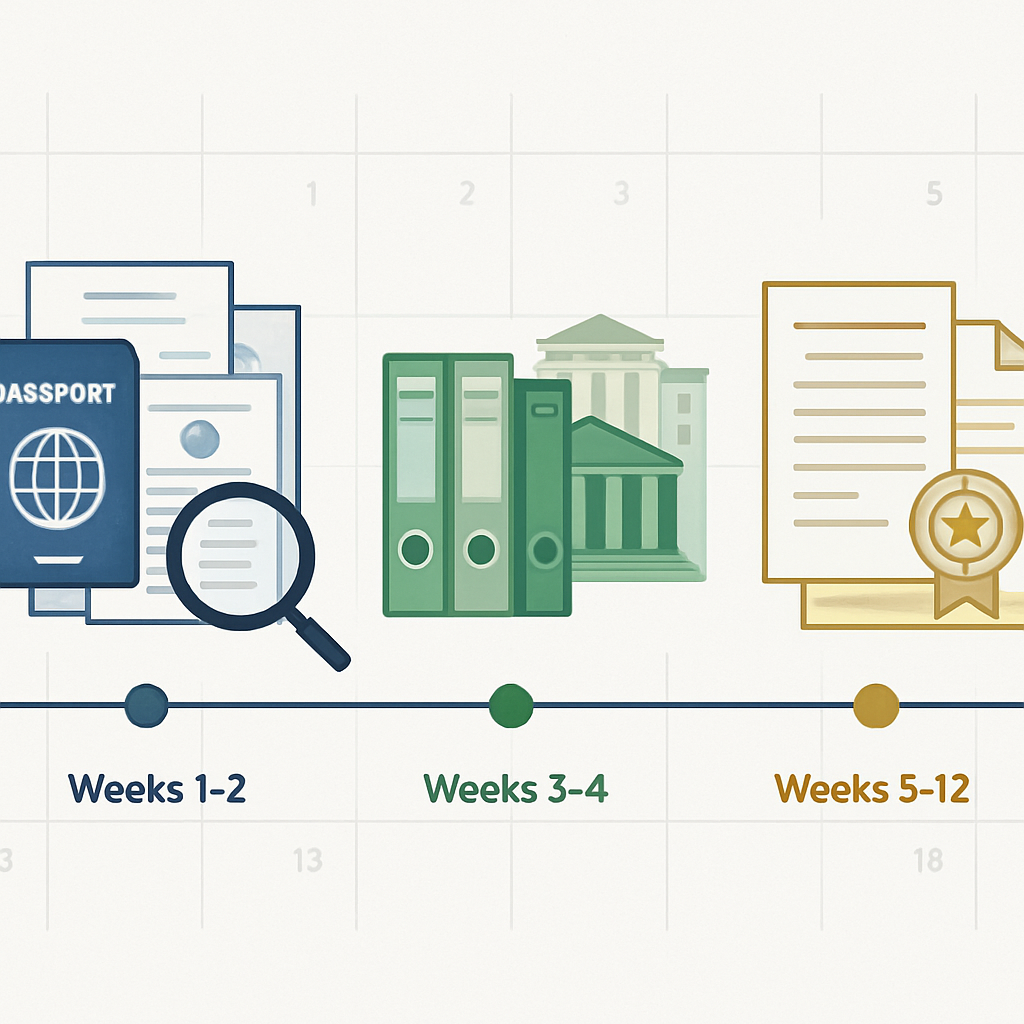
Document Preparation Phase (Week 3-4):
- Ensure all originals are complete and legible
- Obtain additional copies if needed
- Coordinate with educational institutions for any missing documents
Processing Times for Different Document Types
| Document Type | Standard Processing | Rush Processing | Complexity Level |
|---|---|---|---|
| Academic Transcripts | 5-7 business days | 2-3 business days | Medium |
| Diplomas/Certificates | 3-5 business days | 1-2 business days | Low |
| Birth Certificates | 2-4 business days | 1 business day | Low |
| Financial Documents | 7-10 business days | 3-5 business days | High |
| Professional Certificates | 5-8 business days | 2-4 business days | Medium-High |
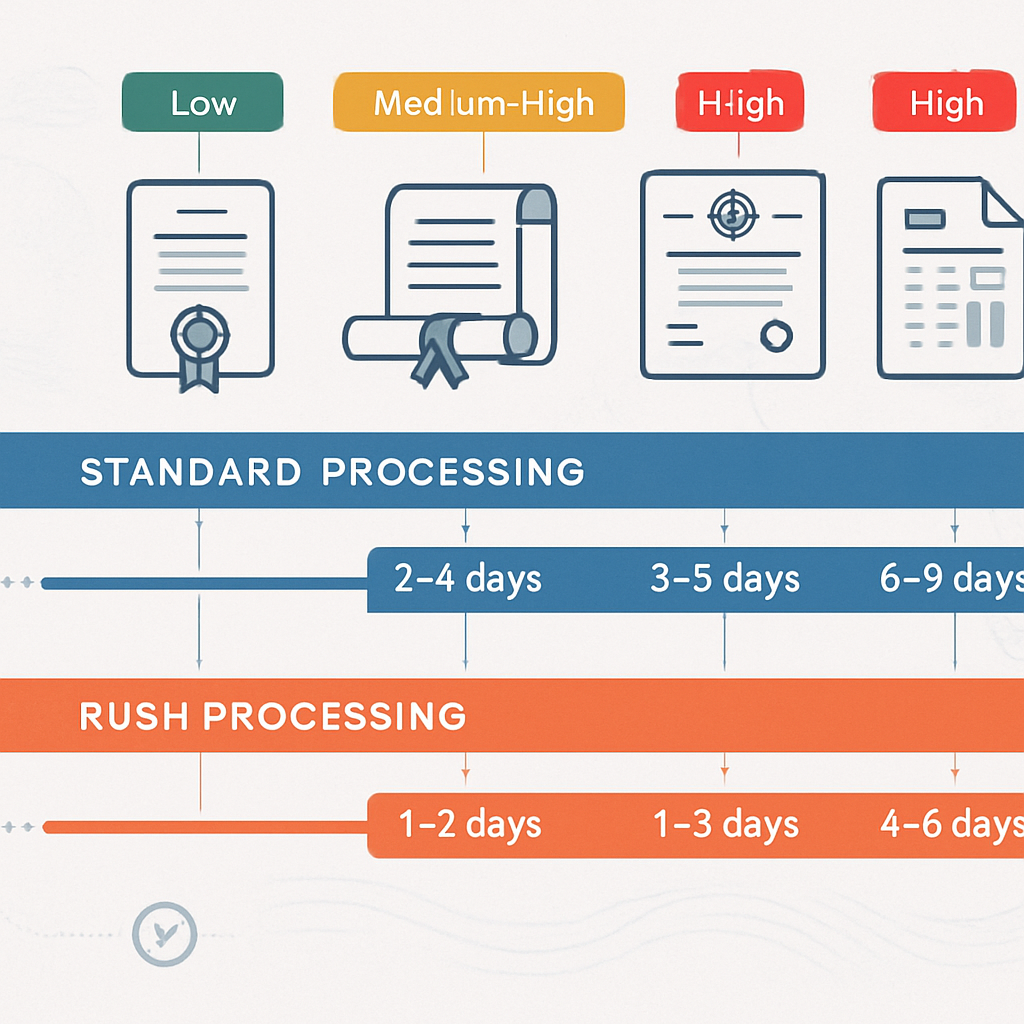
Factors Affecting Processing Time:
- Document complexity and length
- Language pair (some languages require specialist translators)
- Translator workload and availability
- Quality review requirements
- Certification and notarization processes
Building Buffer Time for Potential Revisions
Recommended Buffer Schedule:
Week 5-6: Initial Translation Submission
- Submit documents to chosen translation service
- Maintain regular communication with translator
- Prepare for potential clarification requests
Week 7-8: Review and Revision Period
- Receive initial translations
- Review for completeness and accuracy
- Request revisions if necessary
- Allow time for translator corrections
Week 9-10: Final Preparation
- Receive final certified translations
- Organize complete document package
- Schedule visa appointment
- Prepare for potential last-minute document requests
Emergency Contingency Planning:
- Identify backup translation services
- Keep digital copies of all documents
- Maintain contact with document-issuing institutions
- Consider expedited processing options
Common Revision Scenarios:
- Formatting adjustments for German authority requirements
- Additional context notes for educational qualifications
- Clarification of technical terminology
- Correction of minor errors in original documents
This timeline ensures you have adequate time to address any unexpected issues while maintaining your target application date. Remember, rushing the translation process often leads to errors that can delay your entire visa application by months.
Quality Assurance in Professional Translation Services
Professional translation services employ rigorous quality assurance protocols to achieve the 99.9% accuracy standard required for German visa applications. Understanding these processes helps students make informed decisions when selecting translation providers.
Multi-step Review Processes Used by Certified Translators
Certified translation services implement a comprehensive three-tier review system:
1. Initial Translation Phase
- Primary translator with German legal document specialization
- Native-level proficiency in both source and target languages
- Minimum 5 years experience in visa documentation
2. Quality Review Stage
- Secondary translator performs blind review
- Cross-verification of technical terms and legal terminology
- Consistency checks across multiple documents
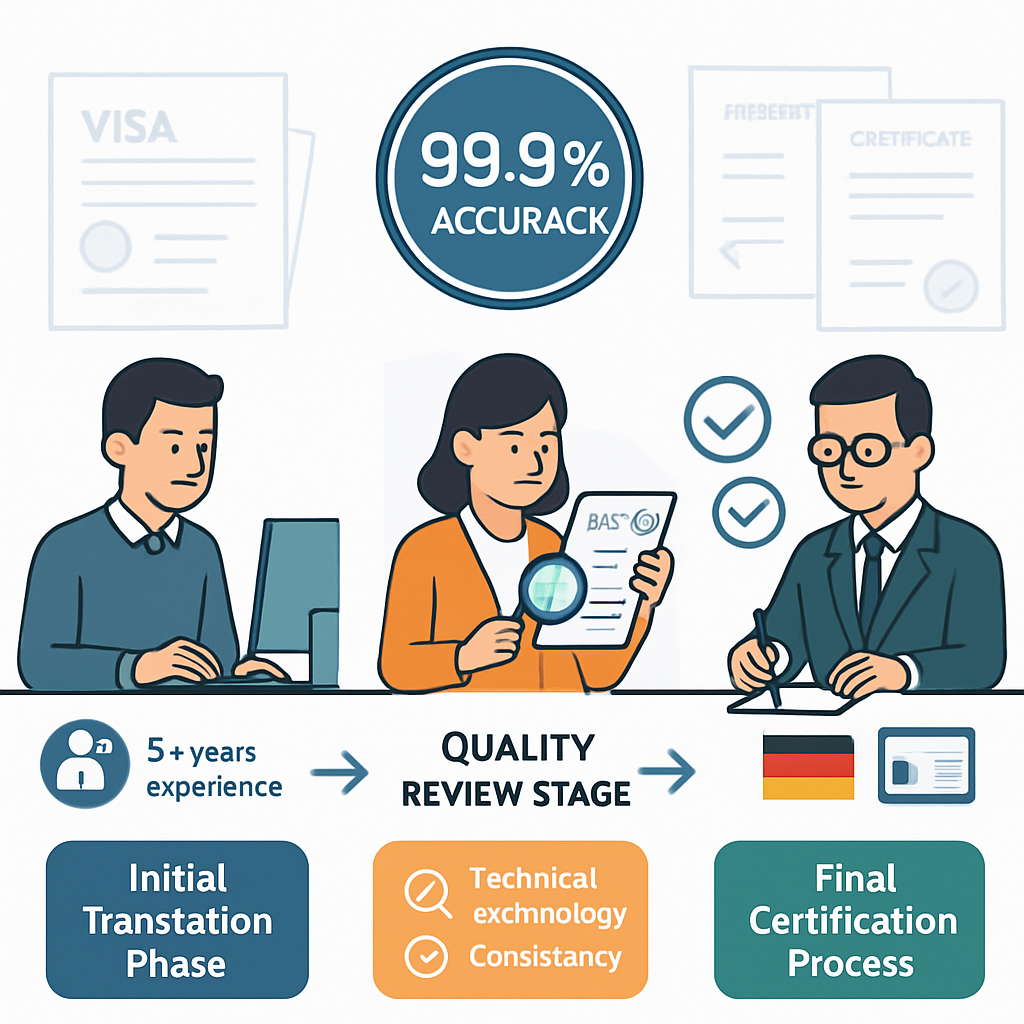
3. Final Certification Process
- Certified translator validates accuracy
- Official seal and signature application
- Compliance verification with German legal standards
This multi-layered approach ensures that critical details like academic grades, course names, and institutional information are translated with absolute precision. For example, translating "Bachelor of Engineering in Mechanical Engineering" requires exact terminology that German authorities recognize within their educational framework.
Technology Tools That Enhance Accuracy
Modern translation services leverage advanced technology to supplement human expertise:
| Technology Tool | Function | Accuracy Improvement |
|---|---|---|
| CAT (Computer-Assisted Translation) | Terminology consistency | 15-20% error reduction |
| Translation Memory | Reuse of previously verified translations | 25% faster processing |
| Quality Assurance Software | Automated error detection | 30% improvement in consistency |
These tools are particularly valuable for standardized document elements like university names, degree classifications, and official titles that must maintain consistent translation across all documents.
Certification and Apostille Requirements for German Authorities
German visa applications require specific certification protocols:
Certified Translation Requirements:
- Official translator certification recognized by German authorities
- Translator's official stamp and signature
- Declaration of accuracy and completeness
- Contact information for verification purposes
Apostille Process for International Documents:
- Original document apostille from issuing country
- Certified translation of apostilled document
- Proper sequence: Document → Apostille → Certified Translation
Students must ensure their translation provider understands these specific requirements, as incorrect certification can result in automatic visa rejection regardless of translation accuracy.
Cost-Benefit Analysis of Premium Translation Services
Investing in high-quality translation services represents a critical financial decision for students pursuing German visas. A comprehensive cost analysis reveals why premium services deliver superior long-term value.
Breakdown of Professional Translation Costs
Professional translation pricing varies based on document complexity and turnaround requirements:
Standard Pricing Structure:
- Academic transcripts: €25-40 per page
- Degree certificates: €30-45 per document
- Personal documents (birth certificates): €20-35 per page
- Technical documents: €35-55 per page
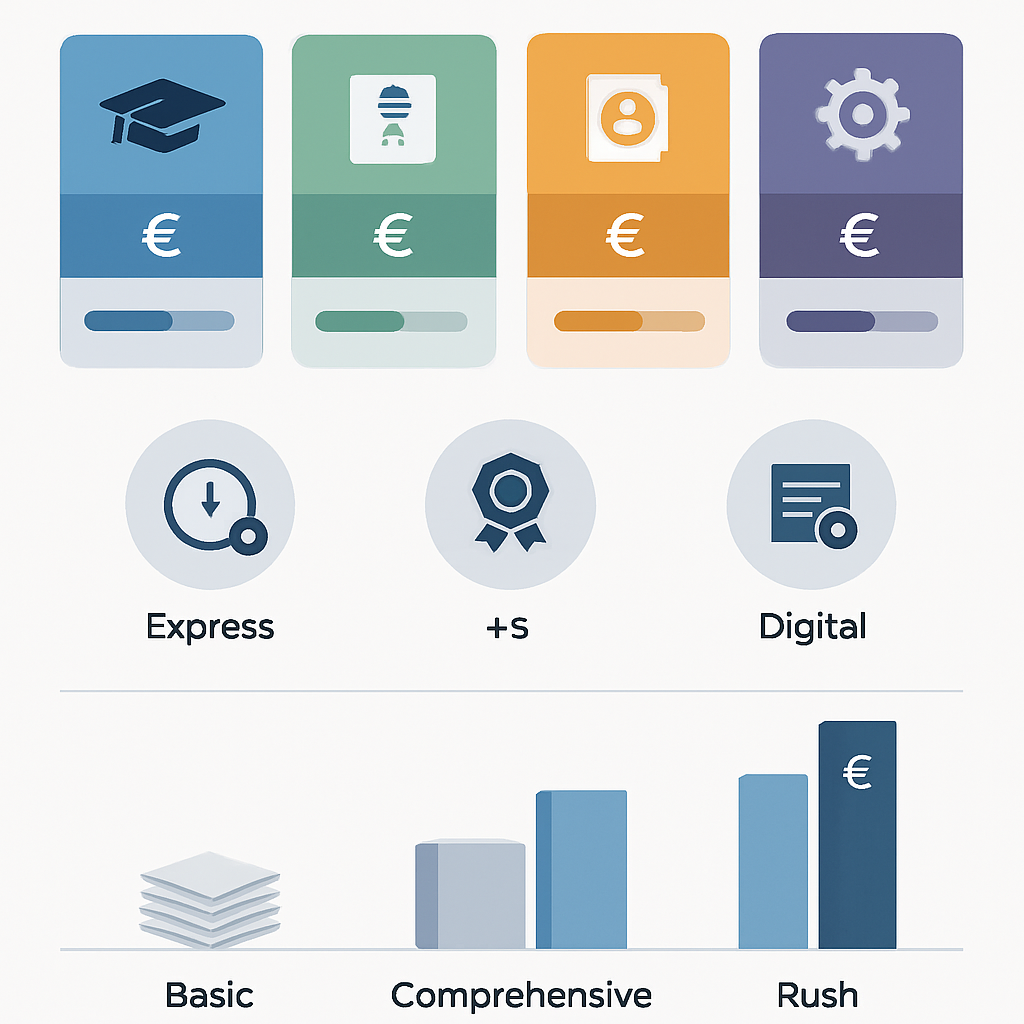
Premium Service Additions:
- Express processing (24-48 hours): +50% surcharge
- Notarization services: €15-25 per document
- Digital certification: €10-15 per document
Complete Package Estimates:
- Basic application set (5-7 documents): €150-250
- Comprehensive application (10-15 documents): €300-500
- Rush processing complete set: €450-750
Hidden Costs of Rejected Visa Applications
Visa rejection due to translation errors creates cascading financial consequences:
Direct Rejection Costs:
- Visa application fee (non-refundable): €75-100
- Re-application administrative costs: €50-75
- Additional document preparation: €100-200
Indirect Financial Impact:
- Delayed enrollment penalties: €500-2,000
- Extended accommodation costs: €400-800 per month
- Lost scholarship opportunities: €1,000-5,000
- Flight rebooking fees: €200-600
Time-Related Expenses:
Students facing rejection often experience 3-6 month delays, resulting in:
- Additional living expenses in home country
- Potential loss of admission slot
- Career progression delays valued at €10,000-25,000 annually
ROI of Investing in High-Accuracy Translation Services
Premium translation services deliver measurable return on investment:
Success Rate Comparison:
- Premium services (99.9% accuracy): 97% visa approval rate
- Standard services (95-98% accuracy): 78% visa approval rate
- Budget services (90-95% accuracy): 52% visa approval rate
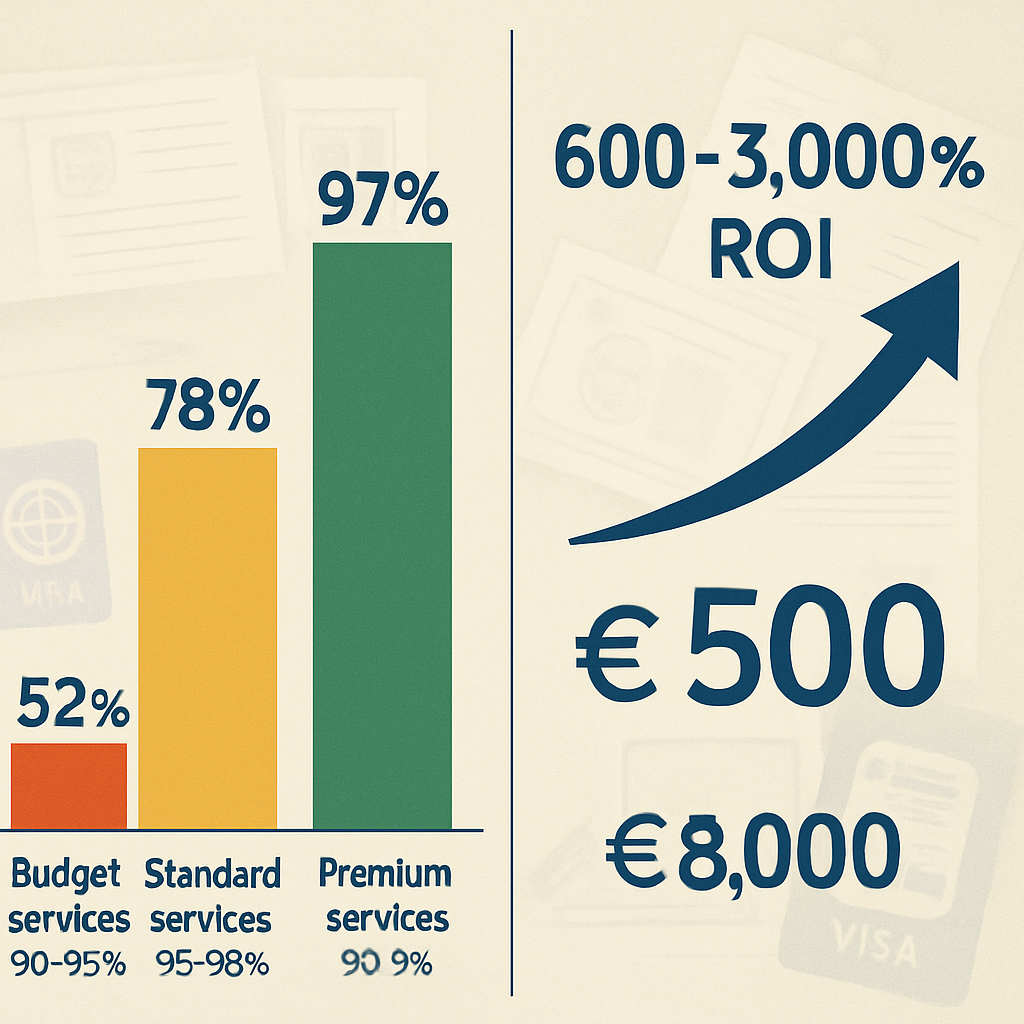
Financial ROI Calculation:
- Premium service investment: €500
- Rejection avoidance value: €3,000-8,000
- Time savings value: €5,000-15,000
- Total ROI: 600-3,000% return on investment
Risk Mitigation Benefits:
Premium services provide additional value through:
- Revision guarantees if authorities request clarification
- Direct communication with German consular offices
- Expedited re-processing for urgent applications
- Professional liability insurance coverage
The data clearly demonstrates that investing in premium translation services costs significantly less than managing rejection consequences, making high-accuracy translation an essential component of successful German visa strategy.
Frequently Asked Questions
Question 1: How much should I budget for certified document translations for my German Ausbildung visa?
Expect to budget €150-400 total for all required translations. Individual documents typically cost €25-80 each, depending on length and complexity. Academic transcripts and diplomas are usually €30-50, while birth certificates cost €25-35. Medical certificates may reach €60-80 due to technical terminology. Always request quotes from certified translators beforehand and factor in potential rush fees (20-50% extra) if you're working with tight deadlines. Consider this an essential investment rather than an optional expense – cheaper, non-certified translations will be rejected by German authorities, potentially costing you months of delays and reapplication fees.
Question 2: Can I translate my documents myself to save money, then have them certified?
No, this approach will not work for German visa applications. German authorities only accept translations completed entirely by certified translators or sworn translators (vereidigte Übersetzer). Self-translation followed by certification is not legally valid, regardless of your language skills. The translator must be officially recognized and stamp/sign the translation with their certification details. Attempting this shortcut will result in document rejection and significant delays. Instead, research affordable certified translators in your area or consider online certified translation services that specialize in visa documentation to find cost-effective options.
Question 3: How long does the certified translation process typically take?
Standard certified translations take 3-7 business days for most documents. Simple certificates (birth, marriage) are usually completed within 3-5 days, while complex academic documents may require 5-7 days. Rush services can deliver within 24-48 hours but cost 20-50% more. Plan ahead by starting translations 2-3 weeks before your visa appointment. Remember that some translators may require additional time during peak seasons (summer months when many students apply). Always confirm delivery timelines upfront and request email delivery of scanned certified copies while waiting for originals by mail.
Question 4: What happens if my translator makes a small mistake – will my visa be automatically rejected?
Not necessarily, but it depends on the type and location of the error. Minor formatting issues or small spelling mistakes in non-critical sections might be overlooked, but errors in names, dates, grades, or official titles will likely cause rejection. German visa officers are trained to spot inconsistencies and may request re-translation of questionable documents. To avoid this risk, always review translations carefully before submission and ask your translator to double-check critical information. Most reputable certified translators offer correction services for their own errors at no charge, so choose established professionals with good track records.
Question 5: Do I need to translate documents that are already in English for German visa applications?
Yes, all foreign documents must be translated into German, including those originally in English. German visa authorities require German-language translations regardless of the source language. This applies to transcripts from English-speaking universities, English birth certificates, and medical records. The only exceptions are documents already issued in German by German institutions. Don't assume English documents will be accepted – this is a common misconception that causes application delays. Budget for translating all your foreign documents, even if they seem "international" or widely understood.
Question 6: How can I verify that my translator is properly certified for German visa applications?
Check that your translator is either a sworn translator (vereidigter Übersetzer) officially appointed by German courts, or certified by recognized translation associations in your country. Request to see their certification credentials and ask for their official stamp/seal number. Reputable translators will readily provide this information. You can verify German sworn translators through the database of the respective German state courts. For translators in other countries, contact the German consulate to confirm they accept certifications from specific local associations. Always request a sample of their certification format before proceeding.
Question 7: Should I get extra certified copies of my translations in case something goes wrong?
Yes, order 2-3 certified copies of each translation initially. German authorities require original certified translations, and you may need copies for different application stages, university enrollment, or future visa renewals. Additional copies ordered simultaneously are usually cheaper (€5-15 each) than requesting them later. Keep one set for your visa application, one for your personal records, and one spare for unexpected requirements. Some universities also request certified translations for enrollment, separate from visa requirements. Having extras prevents delays and additional costs if documents are lost or additional copies are needed unexpectedly.
Question 8: What should I do if German authorities question the accuracy of my certified translations?
Immediately contact your certified translator to review the questioned sections and request clarification documentation. Reputable translators will provide explanation letters detailing their translation choices for technical terms or cultural concepts. If errors are confirmed, request corrected versions promptly – most certified translators correct their own mistakes free of charge. Document all communications with the translator and submit explanation letters alongside corrected translations to German authorities. In rare cases, you may need a second opinion from another certified translator. Act quickly, as visa processing timelines don't pause for translation issues, and delays could affect your Ausbildung start date.
Conclusion
Your Ausbildung dreams in Germany are within reach, but the foundation of your visa success lies in the precision of your document translations. Remember these critical takeaways: German authorities demand certified translations that meet their exact legal standards, your academic certificates, financial documents, and personal records must achieve 99.9% accuracy to avoid costly delays or rejections, and even minor translation errors can derail months of careful preparation. The difference between visa approval and disappointment often comes down to whether your documents meet Germany's meticulous requirements from day one.
Don't let uncertainty about translation requirements become the barrier between you and your future career in Germany. Whether you're feeling overwhelmed by the documentation process or unsure about which documents need certification, these concerns are completely normal and entirely manageable with the right guidance. Every successful Ausbildung student once stood exactly where you are now, questioning whether they could navigate Germany's complex visa requirements. The key is taking action with expert support rather than attempting this critical process alone.
Your next steps are clear and achievable: begin researching specific Ausbildung programs that align with your career goals, gather your academic and personal documents for professional translation, start learning German to enhance your application strength, and most importantly, connect with experienced advisors who understand every nuance of the German visa process. Time is your ally when you start early and work with professionals who ensure your translations meet Germany's exacting standards.
GoAusbildung's expert translation services and comprehensive visa guidance have helped thousands of international students transform their German career aspirations into reality. Our certified translators understand precisely what German authorities expect, ensuring your documents achieve the 99.9% accuracy that makes the difference between approval and rejection. Don't leave your future to chance – contact GoAusbildung today for a personalized consultation and let our proven expertise guide you confidently through every step of your Ausbildung journey. Your German career adventure begins with a single decision to work with professionals who guarantee your success.
About GoAusbildung
Comprehensive resource for guidance on Ausbildung programs in Germany
Ready to Start Your Ausbildung Journey in Germany?
Explore our resources and get personalized guidance to find the perfect Ausbildung program aligned with your career goals.